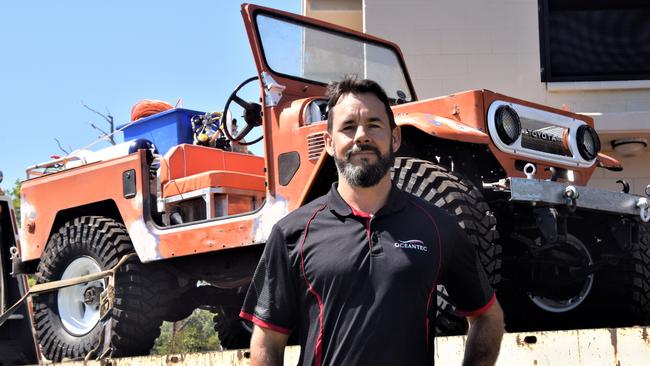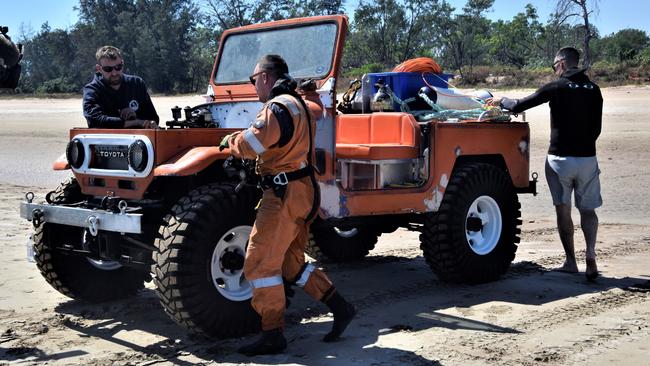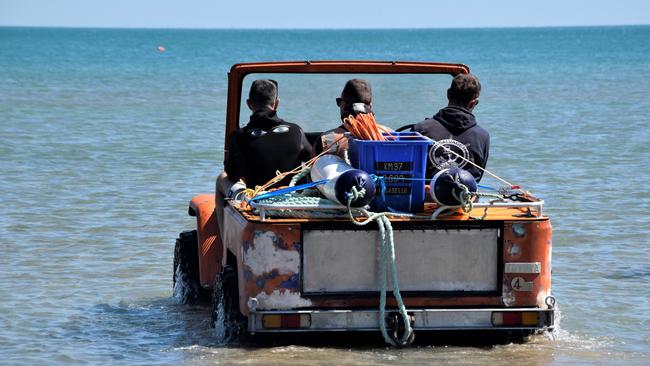LandCruiser to break underwater drive records in Darwin Harbour
A team of engineers, mechanics and divers has converted a LandCruiser into a SeaCrawler ahead of a record-breaking drive attempt across Darwin Harbour.
Northern Territory
Don't miss out on the headlines from Northern Territory. Followed categories will be added to My News.
The first and final test before an attempt at a record-breaking 7km underwater drive across Darwin Harbour was a huge success.
A team of engineers, mechanics and divers held their breath as a rusty orange 1978 LandCruiser drove into the depths of Casuarina Beach.
It was up to Luke Purdy and Taylor Smith to give the engine one last check before the car rolled beneath the waves.

Mr Purdy said what happened during Tuesday’s test would indicate whether Saturday’s record-attempt would sink or swim.
“The aim for today is to try and get as much data out of this thing as possible to try and calculate – if possible – power usages, issues that we may have crossing the harbour,” he said.
“This is really our first live field test and there’s only four days to go until the crossing.”

Mathew Mitchell joined the project 12 months ago and looked forward to seeing the car drive 7km from Mandorah to Mindil Beach.
“The car itself has been built over the last six months,” he said.
“Prior to that, we started doing seabed surveys and mapping the route out – there’s quite a lot of obstacles.”
Mr Mitchell said a team of up to 30 divers would rotate throughout the trip to drive the car, swapping every 12-15 minutes.
He said another team tried to cross Darwin Harbour in 1983 but only made it 4km before they got stuck.

Mr Mitchell said the team was inspired to attempt the record by a four-part LandCrusier docuseries.
“When they were working out what they were going to do with the show, they thought, ‘LandCruisers have done some pretty cool things around Australia from bull-catching to being the dominant vehicle on mine sites and things like that’,” he said.
“The craziest thing they could think of that’s been done in a LandCruiser was (this record), so we thought, ‘let’s give it another try’.”
But the record attempt meant less to Mr Mitchell than the experience of working with a “great bunch of guys” did.
“We’ll get the car to Mindil Beach one way or another,” he said.
“There’s going to be a lot of setup at Mindil Beach – they’ll be livestreaming videos from the divers, I think there’s a jumping castle down there, a bar.”
Mr Mitchell said he hadn’t been very focused on the party-planning side of the project, but was happy to know he could get a beer when the divers emerge from the water.

Mr Mitchell said the test “could not have gone better” and estimated the car could have kept going for about 12 hours.
He said divers took the car for a 1km spin at a depth of about 5m.
Mr Mitchell said the LandCruiser moved through the water at about 1.7 knots using anywhere from 10-50 per cent of the car’s power.
He said all that was left to do before Saturday’s record attempt was to make the car “pretty” with a new coat of paint.

Taylor Smith said emergency protocols for the big day included a way to float the car back to the surface and tether lines.
But Mr Smith was confident the team had expertly crafted a vehicle that would safely travel across Darwin Harbour.
“On paper, this can’t fail,” he said.
“Practicality and life tells us it shouldn’t but between me and Luke everything sort of goes wrong every single day we touch something, so these tests are critical.”
Mr Purdy called the backup plans “pessimist procedures”.




